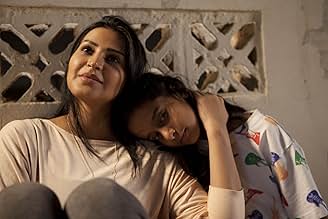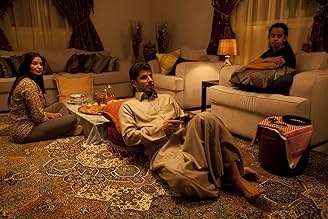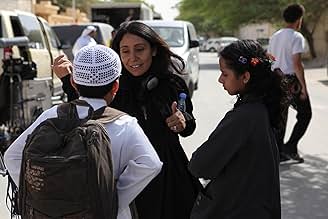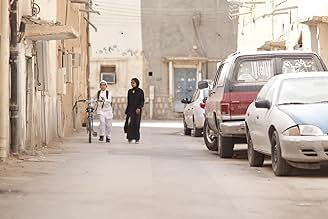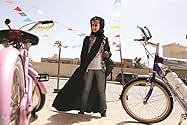IMDb-BEWERTUNG
7,5/10
22.032
IHRE BEWERTUNG
Ein Mädchen in Saudi-Arabien meldet sich beim Koranwettbewerb ihrer Schule an, um das erforderliche Geld für ein grünes Fahrrad zu sammeln, das sie unbedingt haben möchte.Ein Mädchen in Saudi-Arabien meldet sich beim Koranwettbewerb ihrer Schule an, um das erforderliche Geld für ein grünes Fahrrad zu sammeln, das sie unbedingt haben möchte.Ein Mädchen in Saudi-Arabien meldet sich beim Koranwettbewerb ihrer Schule an, um das erforderliche Geld für ein grünes Fahrrad zu sammeln, das sie unbedingt haben möchte.
- Regie
- Drehbuch
- Hauptbesetzung
- Nominiert für 1 BAFTA Award
- 22 Gewinne & 36 Nominierungen insgesamt
Abdullrahman Al Gohani
- Abdullah
- (as Abdullrahman Algohani)
Sara Al Jaber
- Leila
- (as Sara Aljaber)
Empfohlene Bewertungen
10-year-old Wadjda lives in Saudi Arabia. She's a bit rebellious, which means she wears basket shoes in school, listens to Western rock at home and has befriended a boy her own age. But she mustn't sing too loud, because the men can hear her and get offended.
Wadjda wants to go further and have her own bicycle, which invites trouble in her country. The story is told in a very warm way and you learn one thing. People in cultures totally different from yours are very much like you.
Realism here. Everyday people having everyday problems, but not the problems you have. A humanistic film, which makes it concerning everybody.
Wadjda wants to go further and have her own bicycle, which invites trouble in her country. The story is told in a very warm way and you learn one thing. People in cultures totally different from yours are very much like you.
Realism here. Everyday people having everyday problems, but not the problems you have. A humanistic film, which makes it concerning everybody.
WADJDA is a straightforward tale of a young girl Wadjda (Waad Mohammed) growing up in a suburb of Riyadh, Saudi Arabia, who wants to buy a bicycle. Unable to find the money to do so, she enters a competition to speak the Koran in public with a substantial cash prize. After considerable time spent studying the text, she wins the competition, but sadly doesn't receive the money. In the end, however, she achieves her dreams - but not in the way she expects. Haifaa Al-Mansour's film is noteworthy for being a woman's film directed by a woman; it shows in careful detail the ways in which women's lives are constructed in Saudi Arabia, as well as showing how influential the Koran is in determining people's behavior. Some viewers might think that the women's lives are unfairly restricted; the film suggests that this is what many women believe is the right thing to do. By doing so, WADJDA shows how different people embraces different concepts of Islam. On the other hand, the film also suggests that individuals - especially children - should have at least some means to express themselves, particularly when they have worked to hard to achieve their aims. To restrict them is also to repress them; and this ultimately leads them to accept subordination as a way of life. WADJDA proves that the opposite should be true; not only for Wadjda herself but also for her mother (Reem Abdullah).
We went to see this as a family, with our two daughters, 14 and 16. We all enjoyed it. Seeing how the limitations placed on women in Saudi Arabia play out in everyday life was of great interest to all of us. The story line depicted not only Wadjda's efforts to break free from her circumscribed world, but also how adult women struggle to survive. The effort to simply support oneself without a man when one can't even drive or wear clothes that allow for mobility reflects how rules ostensibly meant to "protect" women keep them dependent on men for the most rudimentary basics.
I suspect that even this film does not depict the lives of women in Saudi Arabia completely accurately. Some concessions seem to have been made to the government. No religious police are to be seen, for example. Nonetheless, it is well worth seeing, and we applaud Haifaa al-Mansour for making it. We look forward to her future work.
I suspect that even this film does not depict the lives of women in Saudi Arabia completely accurately. Some concessions seem to have been made to the government. No religious police are to be seen, for example. Nonetheless, it is well worth seeing, and we applaud Haifaa al-Mansour for making it. We look forward to her future work.
One thing that makes this movie stands out is the fact that it is entirely based in Saudi Arabia.
Regardless what one thinks of that country, be that knowledge or just stereotyping, it has a culture that is very different than that of what the western audience is accustomed to.
So he have a heroine who is your typical rebel teenage girl, who has realised that being a woman can be challenging and she therefore must give her fight to survive. The story revolves around an utterly sinful desire this young revolver has: to buy and ride a bicycle. To go about that, she must overcome her mum's objections, the shopkeeper's and pretty much everyone she is acquainted with.
Unprepared to simply accept fate, she is prepared to do whatever it takes to ride that bicycle. Quirky and witty, this is a delight and one should not allow any preconceived notions of Arabic culture to stand in the way of enjoying this pleasurable debut.
Wadjda is a hero in any culture.
Regardless what one thinks of that country, be that knowledge or just stereotyping, it has a culture that is very different than that of what the western audience is accustomed to.
So he have a heroine who is your typical rebel teenage girl, who has realised that being a woman can be challenging and she therefore must give her fight to survive. The story revolves around an utterly sinful desire this young revolver has: to buy and ride a bicycle. To go about that, she must overcome her mum's objections, the shopkeeper's and pretty much everyone she is acquainted with.
Unprepared to simply accept fate, she is prepared to do whatever it takes to ride that bicycle. Quirky and witty, this is a delight and one should not allow any preconceived notions of Arabic culture to stand in the way of enjoying this pleasurable debut.
Wadjda is a hero in any culture.
The director Haifaa Al-Mansour tells the tale of a child called Wadjda whose wish is to have her own bicycle so that she might race against her friend and neighbour Abeer. The only problem is that Wadjda is a girl and girls in Saudi society do not ride bikes, which are considered "boys' toys" ... As we follow Wadjda in her quest to find the money to purchase the bicycle she sees being delivered on the roof of a van, we are introduced to her society and its culture and, in particular, its treatment of girls and women. Al-Mansour's portrayal of her country is shown without heavy judgement, although the bitter sweetness of being female is not concealed.
Filmed on location in Saudi Arabia, a feat in itself in a country that does not have a film industry as films are considered sinful, Wadjda's desire represents the wish for female freedom; her lack of a bicycle is mirrored in the adult women's inability to drive, prohibited for women in Saudi Arabia, and the problems this creates for them. So the child's desire to ride a bike becomes a metaphor for freedom, which is the central theme in the film.
This is a subtle tale full of character, charm and complexities and not at all as one might expect. The young girl who carries the film, Waad Mohammed, is terrific and it is hard to believe that she was not an actress before appearing in this feature.
Does Wadjda achieve her desire and get her bike? Is she able to race it along the dusty roads as free as her friend Abeer and the other boys? Well, you will have to watch the film for the answers and in watching the film will support the director and the nascent film industry emerging from within Saudi Arabia.
Filmed on location in Saudi Arabia, a feat in itself in a country that does not have a film industry as films are considered sinful, Wadjda's desire represents the wish for female freedom; her lack of a bicycle is mirrored in the adult women's inability to drive, prohibited for women in Saudi Arabia, and the problems this creates for them. So the child's desire to ride a bike becomes a metaphor for freedom, which is the central theme in the film.
This is a subtle tale full of character, charm and complexities and not at all as one might expect. The young girl who carries the film, Waad Mohammed, is terrific and it is hard to believe that she was not an actress before appearing in this feature.
Does Wadjda achieve her desire and get her bike? Is she able to race it along the dusty roads as free as her friend Abeer and the other boys? Well, you will have to watch the film for the answers and in watching the film will support the director and the nascent film industry emerging from within Saudi Arabia.
Wusstest du schon
- WissenswertesBecause of restrictions placed on women in Saudi Arabia, director Haifaa Al-Mansour was not allowed to interact with her mostly male crew. She had to direct the street scenes from a nearby van, watching through a monitor and giving instructions via walkie-talkie.
- PatzerWhen Wadjda takes the bread out of the oven, mic equipment is visible on her waist, under her T-shirt.
- VerbindungenFeatured in At the Movies: Venice Film Festival 2012 (2012)
- SoundtracksDead Island
© Copyright 2012 and Published by Deep Silver, a division of Koch Media
Gmbh, Gewerbegebiet 1, 6604 Hofen, Austria.
Developed 2011, Techland Sp, z.o.o., Poland,
© Copyright 2012, Chrome Engine, Techland Sp. z.o.o.
Top-Auswahl
Melde dich zum Bewerten an und greife auf die Watchlist für personalisierte Empfehlungen zu.
Details
Box Office
- Bruttoertrag in den USA und Kanada
- 1.347.747 $
- Eröffnungswochenende in den USA und in Kanada
- 41.253 $
- 15. Sept. 2013
- Weltweiter Bruttoertrag
- 6.499.169 $
- Laufzeit
- 1 Std. 38 Min.(98 min)
- Farbe
- Sound-Mix
- Seitenverhältnis
- 1.85 : 1
Zu dieser Seite beitragen
Bearbeitung vorschlagen oder fehlenden Inhalt hinzufügen







